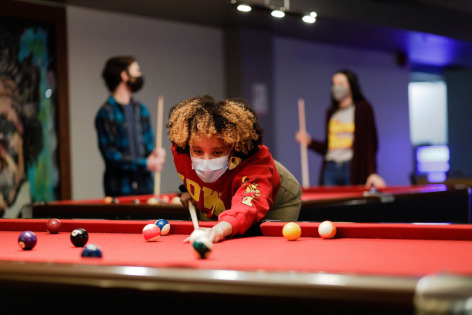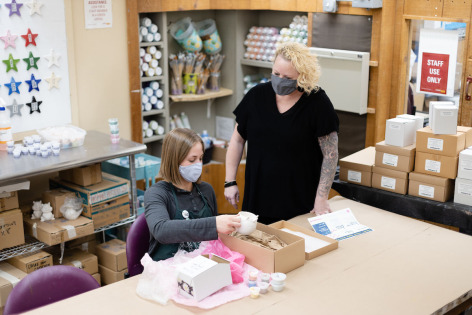By Kristin Erdman, Memorial Union

Graduate student Isis Walker plays pool at the Memorial Union's CyBowl and Billiards. Photo by Ryan Riley
AMES, Iowa – The decision to close the Memorial Union on March 17, 2020, for the safety of the Iowa State University community was a necessary step in response to the COVID-19 pandemic, but a heartbreaking one for the staff members who work there. Memorial Union Director Steve Winfrey says it was the first time the MU closed for an extended period since the building opened in 1928.
While no one could have foreseen that the building would close in March, the MU staff took advantage of the timing to start on planned construction and renovation projects to benefit students and the ISU community. This included converting the Browsing Library into an art gallery and continued improvements to CyBowl & Billiards.
“It was a natural decision to start the projects as the pandemic slowed other work tasks down, and the empty building also allowed for the projects messiness to go unnoticed and project noise to go unheard,” Winfrey said. “With the upcoming renovation on the 4-6 floors of the MU, the timing was perfect to reuse materials such as trim and doors that would have been thrown away in the construction process. Instead, the MU saved a lot of money reusing, recycling, and reducing waste.”
Continue reading about the MU renovations and upgrades.
Keeping the ISU community connected to the arts

Letitia Kenemer, right, with Jillian Dunlap in the Memorial Union Workspace assemble Art-2-Go kits. Photo by Ryan Riley
With the shift to virtual classes and remote work in the spring, Letitia Kenemer, coordinator of the Arts & Workspace in the Memorial Union, was determined to keep connecting people to art. Within a few weeks of the campus going virtual, Kenemer began offering Art-2-Go kits from the Workspace.
Using supplies and materials she already had on-hand, she put together packages filled with basic supplies, such as wood or a blank canvas, paint, glue and brushes, along with instructions on how to make the craft at home.
“At the time, many businesses were starting curbside or delivery services, so I started thinking about what I could do,” Kenemer said. “I had purchased lots of supplies for the planned events through the end of the semester, so I knew I could offer the kits without spending any money, which was is short supply for everyone at the time. I also knew the incredible amount of stress that having kids home from school had on parents, and I thought that this could help with another activity that was set up and ready to go.”
“Doing this was my way of coping with the crisis,” she added, “and it was a life saver for me. I was able to think creatively and be hands-on in organizing supplies and putting kits together. We are all missing family and friends, but this helped fill up that part of my soul that needs art, creativity and connection.”
Continue reading about Kenemer’s creativity during the pandemic.
The return of ISU AfterDark
Attending ISU AfterDark is a beloved Iowa State tradition for many students. Katie Haygood, program coordinate at the MU, says a campus life survey found 94% of students agreed that AfterDark positively impacts their experience at Iowa State.
When classes at Iowa State went virtual, many planned events across campus were cancelled, including the April AfterDark, but Haygood and the AfterDark student organizers were determined to bring the program back for the fall. After all, AfterDark’s mission has always been to provide safe, entertaining, substance-free programming for students, and students needed that more than ever during a pandemic. So Haygood developed mitigation strategies for in-person events.
“We increased sanitization in Bingo, provided socially distanced markers for the hallway, hand sanitizer throughout the MU, and we made sure participants were wearing face coverings at all times. We also made the hard decision to not provide food at the event to ensure that face coverings stayed on,” Haygood said. “The biggest remorse from our student leaders was from not being able to offer free Panda Express. Panda is extremely popular, and they were bummed to not have it as an option, but they understand the importance of health and safety at an event.”
Continue reading about how MU programs are engaging students.
Read the series
Learn more about ISU’s pandemic response in a collection of stories highlighting some of the hard work, dedication and collaboration across campus.